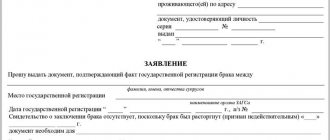Grounds for registering a double surname
One of the mandatory formalities that newlyweds must complete when submitting an application to the registry office is the indication of the future surname of the spouses. The law allows for various options for choosing a family name, including a double surname.
When applying for marriage registration, a man and a woman will have to fill out several mandatory lines and sections. Mandatory points of the application also include an indication of the future surname of the married couple. The law allows the following choices:
- preservation of premarital surnames for each spouse;
- establishing the premarital surname of one of the applicants for both spouses;
- choosing a double surname.
The most obvious option for establishing a double (compound) surname would be to choose it when filling out a joint application. You can get advice about the nuances of such a choice from the experts of the “Everything step by step” website.
The procedure for forming a double surname for spouses is determined by the RF IC:
- a double surname is formed by joining the premarital surnames of the husband and wife;
- a double surname is written in official documents with a hyphen.
This choice requires the free will of both newlyweds. The lack of consent of at least one of the citizens does not give rise to legal consequences and changes in the personal data of citizens.
The law also defines situations when you cannot choose a double surname:
- it is unacceptable to combine the premarital names of husband and wife if at least one of them was already a double name;
- By regulations of individual constituent entities of the Russian Federation, the formation of double surnames may be prohibited or limited due to national, cultural, religious or other traditions.
Find out more Consultation with a lawyer on drawing up a marriage contract
If there are no restrictions on choosing a double surname, when registering with the registry office, this fact will be reflected in the register book and marriage certificate.
The easiest option is to choose a double surname when registering your marriage
Registration procedure
The process of drawing up an application involves entering additional lines into a special form.
This applies to both women and men. In the future, this information will be carried out by civil registry office employees during registration. The required columns in the application are those that involve changing personal information, i.e. personal data.
In other words, future spouses must register the chosen option when entering into marriage:
- keeping maiden;
- choice in favor of the future spouse;
- pair form.
Read also: What does civil marriage mean?
A simple way to obtain a complex form of origin is to send a statement from each party. The award of official status occurs on the basis of expression of will. In the absence of consent from one of the participants, personal information will not be adjusted. That is, only the data of the person who confirmed the choice can be changed.
In addition to restrictions on the use of a premarital couple's surname for one of the participants, there are also regulatory documents in certain regions of Russia. In other words, if restrictions on such a procedure are introduced in the region, citizens will not be able to register a union in the registry office of this subject. Typically, this happens due to national, religious or cultural rules. Therefore, before getting married, you should clarify this possibility.
Double surname after marriage registration: algorithm of actions
If the newlyweds do not establish a double surname when registering their marriage, they retain the right to such a choice during the period of family relations. The procedure for considering an application from a husband and wife will also be carried out by the civil registry office at the place of residence of citizens.
The right to change your surname is provided for in Art. 19 Civil Code of the Russian Federation. The procedure for registering such a fact is defined in Federal Law No. 143-FZ. The actions of spouses to change surnames can be presented in the form of step-by-step instructions :
- Step 1. Making a decision to change the surname (if there are no legal grounds for refusing such a choice);
- Step 2. Payment of state duty;
- Step 3. Apply to the registry office at your place of residence with an application (you must indicate the selected double surname option in the document);
- Step 4. Registry office specialists check register records of marriage registration, personal data of applicants;
- Step 5. Making an entry in the deed book to register a new common surname;
- Step 6. Issuance of a certificate to the spouses, which will indicate the new surname;
- Step 7. Official documents of citizens must be replaced due to a change in surname.
Registration is carried out within a month from the date of application. Civil registry office employees have the right to extend this period for another 1 month if additional verification of documents is needed.
Spouses have the right to apply for a change of surname to the registry office at their place of residence. If the marriage registration was carried out in another registry office, during the verification process a request will be made about the surnames assigned when creating a family. For information on how to submit an application to the registry office through government services, and whether this can be done to assign a double surname, read the link.
Find out more Collection of alimony debt after 18 years
The law does not prohibit changing surnames several times during marriage
Possible difficulties
This procedure has pros and cons. For example, those getting married who decide to take a double surname often have a question: what to do with the children? What surname should they have?
If the parents have ordinary (that is, usually consisting of one word), but different surnames, they can be combined and given to the child a double one. But in the case when the mother and father have the same name (that is, the woman took her husband’s last name after marriage), then the law does not provide for a double one for children.
And yet there are times when parents really want their child to have a double surname. Then you can do the following. The mother must take back her maiden name. To do this, she needs to apply to the civil registry office. After this, the child will be given a double surname.
The second problem the couple faces is disagreement. One of the spouses may want to take a double surname, the other may not. The legislation provides an answer to this: anyone who wants to take a double surname can do so, while the second one has the right to remain with his own.
Another problem may be the legislative norms of individual constituent entities of the Russian Federation. Changing your surname to a double surname may not be allowed due to the cultural or religious traditions of a particular region. To find out whether this problem is relevant specifically in your case, you need to contact the civil registry office and ask about the existence of legal reasons for refusing to change your last name.
It will not be possible to take a double surname if one of the spouses already has one. For example, the husband Ivanov-Smirnov will not be able to give his wife a double surname, because then it will already be a triple one. This problem is solved in the following way: the wife either remains with her last name, or takes her husband’s last name and becomes Ivanova-Smirnova.
Note! After divorcing, spouses can keep a double surname - or return to their previous one.
Documents for changing your last name
To change the surname during marriage, the husband and wife need to fill out a joint application to the registry office. A sample of this form can be obtained by contacting the Civil Registry Office. You can also download a sample application to change your name at the registry office on our website.
In addition to the application, the parties must submit the following forms:
- birth certificate for each applicant;
- a document confirming the existence of a marriage relationship;
- document confirming payment of state duty.
Civil registry office specialists are required to request all other information independently through interdepartmental exchange.
Country of Soviets
And one more important aspect. When exercising your right to change surnames, it is necessary to take into account that persons entering into marriage can make the appropriate combinations only with their current surnames. When forming a common marital surname or when adding the surname of another spouse to their surname, persons cannot use, for example, their previous (including premarital) surnames, as well as the surnames of their relatives or close people, if their surnames differ from the official surnames of the persons joining into marriage.
Of course, this option is more complicated than assigning a double surname to both spouses directly upon marriage, but it is quite possible! I repeat once again that I personally know those who withstood all the thorns of the “name change” procedure with honor :support:
Assigning a double surname to children - nuances
Since during the marriage the spouses have common minor children, they may also need to change their surname. To do this, you need to take into account the nuances specified in Art. 59 RF IC:
- Before a child turns 10 years old, a joint decision on choosing a surname is made by legal representatives (parents, guardians, trustees);
- starting from the age of 10 years, children are required to give consent to each fact of changing their personal data;
- Until the child is 14 years old, a joint request from parents to establish his surname is accepted only with the permission of the guardianship authorities.
Thus, in addition to the standard list of documents, to establish a new surname for a child, you need to perform the following steps:
- for a child under 10 years of age - obtain permission from the local guardianship authority;
- at the age of a minor citizen from 10 to 14 years old - obtain his consent and permission from the guardianship authority;
- When children reach the age of 14, obtain only their consent.
Registration of a change of surname for a child will be carried out according to general rules. Based on the results of assigning a new surname, you need to reissue documents for the children: birth certificate and passport (if the child is 14 years old).
You can suggest topics for future articles by email. We always support feedback from readers, so we will consider all suggestions and advice.
Find out more Statement of claim for deprivation of parental rights
Whose should be first if you take a double?
The tradition of double surnames comes from the distant past. This was once considered a special privilege given to the upper class for special merits, but nowadays it is just a tribute to fashion. The same article 32 of the Family Code of the Russian Federation speaks about this. Future spouses voice their desire to double their surname when submitting a marriage application. One of the spouses can do this too.
When writing a double surname, no spaces are used, only a hyphen. Both surnames are indicated in the nominative case and singular, with the husband’s surname coming first. It is prohibited to change them.
Attention! If you want to be known as an original and take not a double, but a triple surname, we hasten to warn you: this will not work. Triple surnames are not provided for in Russian legislation (paragraph 1 of paragraph 1 of Article 32 of the RF IC).
One more nuance: if your family names are very long, in the future there may be inconvenience when filling out forms and questionnaires . A number of accounting programs also have restrictions on the number of characters, this should also be taken into account.
The right to choose
When getting married, both the bride and the groom can choose what to do with the surname: leave the old one, change it to the spouse’s surname, or combine the new and old one, and thus get a double one. And if earlier, although formally there was such a choice, in fact it almost never stood, since according to traditions women took their husbands’ surnames - and exceptions to this rule were very rare (and most often - in favor of double surnames, among aristocrats), Recently, all three options have been used quite often.
This is due to new trends that have changed the very approach to marriage - now it is not perceived symbolically as the transition of the bride to the groom’s family, moreover, a large patriarchal family in which he is only one of the members, and it is usually headed by his father. Now, at the level of perception, this is precisely the formation of a completely new family, in which the spouses act as equals.
Spouse's last name
This option, despite everything said above, still remains the most common; according to statistics, approximately 80% of girls take their husband’s surname when getting married. However, this is still less than it was before, and in the future the trend towards a decrease in women changing their surname upon marriage is likely to continue.
On the other hand, the number of men taking their wife’s surname has always been at a very low level (within 1%), it will remain the same, since the reasons prompting them to do this remain the same - in most such cases it is the cacophony of their own.
Whichever spouse changes his last name, on the one hand, this brings certain inconveniences, since he will need to change the documents in which the old one appears, and he will have to do this himself. On the other hand, with a single surname for the whole family - both spouses, and therefore their children, this will simplify the paperwork in the future.
Preservation of premarital
According to statistics, about 15% of brides retain their premarital surname - and this is significantly more than ten, and even more so thirty years earlier. Nowadays, changing your surname is no longer considered a mandatory and integral element of marriage, especially since without it you won’t have to re-register a large number of documents.
However, then it may turn out to be more difficult with the same documents: especially if the child has the husband’s last name and there was a divorce, after which he remained with his mother. In such cases, it is often necessary to change the surname for him to make it easier to prepare documents in a variety of situations, but this is a complex process.
Connection of surnames
Getting a double surname upon marriage - this option is preferred by about 3-4% of families. In many ways, it simplifies life, but you have to pay for it with some cumbersomeness of the resulting structure. As a result, there may be inconvenience when filling out documents; often too little space is allocated for the surname, as a result, delays in registration are possible.
If this does not bother you, then no other problems are foreseen. There are several rules:
- You cannot add another part to an already double surname, turning it into a triple one. This will make it too long and difficult to write.
- It is written strictly with a hyphen. For example: Vasiliev-Korotkov.
- When forming a double surname, the surname of each spouse must be placed strictly in the nominative singular case; substitution of letters is not allowed.
Additional information If the marriage is dissolved, each spouse will be able to choose for himself whether to keep the double surname, or remove the “extra” part and return to the old one.
You can change your surname to a double one after the marriage has been concluded. And here there are two options:
- If a woman has already taken her husband's last name, then her maiden name is returned to her, and then her husband's last name is added to it, and it becomes double.
- If no changes were made upon marriage, then the husband’s surname is simply added to the one she already bears.
Exactly the same options are available for men, they are just used much less often.
To carry out the above, you will need to submit an application to the registry office with a package of documents attached (the list can be found directly at the registry office). It will be reviewed within a month, after which either a change will be made, or a negative response will be given to the request with an explanation of the reasons. If refused, you can go to court and appeal this decision.
Whose last name will be first?
Whose last name will be first?
Family law gives freedom to newlyweds in choosing the primacy of their surname. There are no rules. The couple decides whose last name is first.
The only point that future spouses and registry office employees should pay attention to is euphony. The latter can give advice, but they have no right to force you to abandon the chosen option. Therefore, if your last name sounds bad or seems absurd, no one can force you not to take it.
For example: the Sidorov-Petrov family
Let's consider the option: a future husband with the surname Sidorov takes as his wife a citizen with the surname Petrova. Not wanting to renounce her roots, but at the same time feeling the need to “respect” the status of a married woman, the bride is going to combine the surnames of Sidorov and Petrov and enter a new one into her passport with a hyphen. What should she know about this process?
Firstly, the husband's last name always comes first, regardless of alphabetical order. The wife's surname may begin with A, and the husband's with Z, but a strict patriarchy will operate in the common surname - first male, then female. In our case – Sidorova-Petrova.
Secondly, you can add to your premarital surname only the surname of your husband, but not the more euphonious maiden name, for example, of your mother-in-law. That is, our girl will not become Obolenskaya-Petrova, for example.
Thirdly, if the future wife already has a double surname - at birth she is Petrova-Kuznetsova - then the registry office employees will not allow her to replace one of the surnames with her husband’s data.
And finally, fourthly: the husband will also have to change his data. A double surname in marriage means that both spouses will take it. Citizen Sidorov must become Sidorov-Petrov, there is no other way.
The last factor is the main obstacle for most girls considering options for a double surname. Most often, future husbands “take a pose” and are not going to change anything. Is there a way to get around this situation? Yes, there is, and this opportunity is right in sight.









